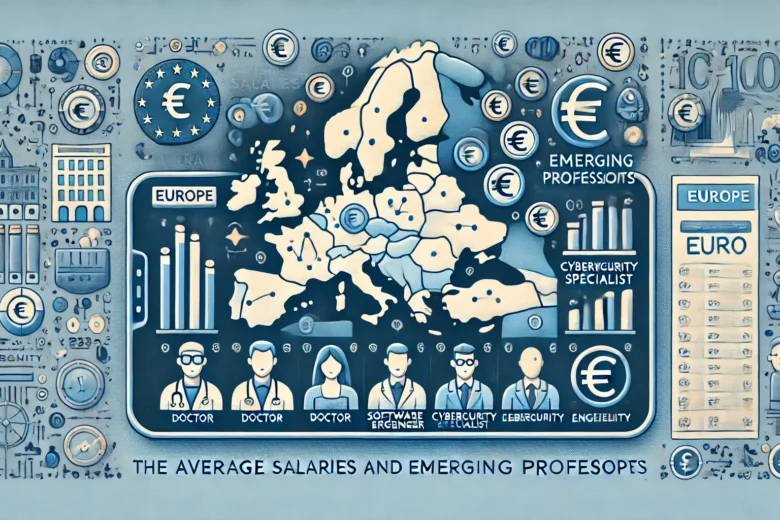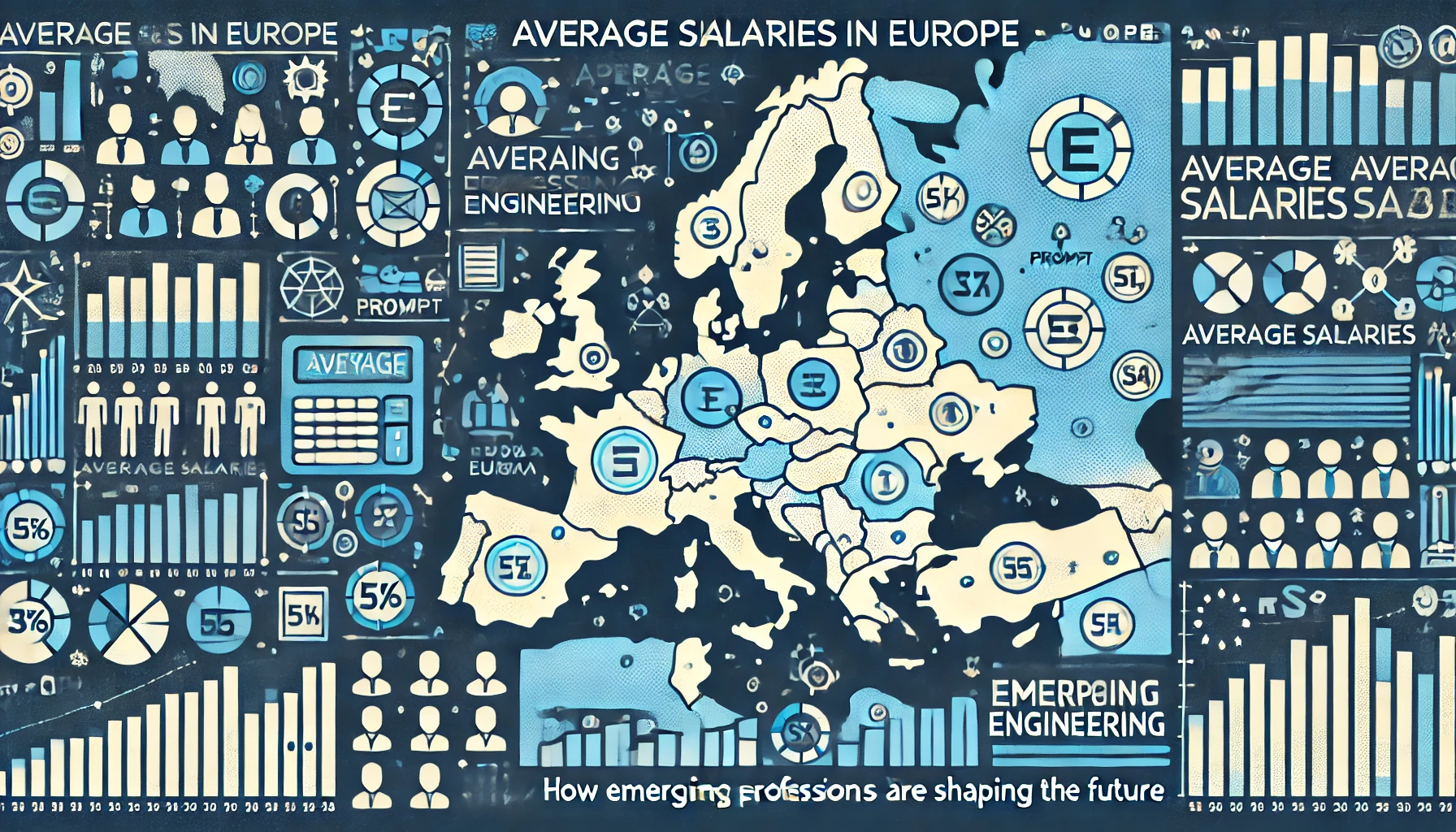As the European job market evolves, understanding the average salaries across various professions can provide valuable insights for job seekers, employers, and policymakers. This comprehensive guide will cover the salaries of traditional professions in five key countries: Portugal, Spain, France, Germany, and Switzerland, while also discussing the rise of emerging roles like Prompt Engineer, Cybersecurity Specialist, and more.
1. Traditional Professions: Salary Overview in 5 European Countries
1.1. Software Engineer
Software engineering remains one of the most lucrative fields, driven by the increasing demand for technology solutions. Salaries vary significantly across countries:
• Portugal: €25,000 – €45,000 annually
• Spain: €35,000 – €55,000 annually
• France: €45,000 – €65,000 annually
• Germany: €60,000 – €80,000 annually
• Switzerland: €85,000 – €120,000 annually
In Switzerland, software engineers command the highest salaries, reflecting the high cost of living and the strong tech industry presence. Germany also offers competitive salaries due to its status as a tech hub, while Portugal and Spain have lower salaries, which can be offset by their lower cost of living.
1.2. Healthcare Professionals (Doctors, Nurses)
Healthcare roles are well-compensated in Europe, especially in countries with advanced healthcare systems.
• Doctors:
• Portugal: €35,000 – €60,000
• Spain: €50,000 – €75,000
• France: €65,000 – €90,000
• Germany: €75,000 – €110,000
• Switzerland: €100,000 – €150,000
• Nurses:
• Portugal: €20,000 – €35,000
• Spain: €25,000 – €40,000
• France: €30,000 – €50,000
• Germany: €40,000 – €60,000
• Switzerland: €60,000 – €90,000
Switzerland offers the highest compensation for both doctors and nurses, partly due to the country’s high standards in healthcare. Germany follows closely, while Portugal and Spain offer lower salaries, reflecting differences in public healthcare funding.
1.3. Project Manager
Project management is a versatile profession, with salaries often linked to the industry.
• Portugal: €30,000 – €50,000 annually
• Spain: €35,000 – €55,000 annually
• France: €50,000 – €75,000 annually
• Germany: €60,000 – €90,000 annually
• Switzerland: €80,000 – €120,000 annually
The financial and tech sectors in Switzerland drive high compensation for project managers, whereas salaries are more modest in Southern Europe. However, the role is essential across industries, ensuring project delivery and efficiency.
1.4. Teacher
Teachers’ salaries vary significantly across Europe, often influenced by the education system and regional policies.
• Portugal: €20,000 – €35,000 annually
• Spain: €25,000 – €40,000 annually
• France: €30,000 – €45,000 annually
• Germany: €45,000 – €65,000 annually
• Switzerland: €60,000 – €80,000 annually
Switzerland and Germany offer higher compensation for teachers, often reflecting the country’s investment in education and the cost of living.
1.5. Graphic Designer
Although not the highest-paid profession, graphic design remains important for branding and marketing.
• Portugal: €20,000 – €30,000 annually
• Spain: €25,000 – €35,000 annually
• France: €30,000 – €45,000 annually
• Germany: €40,000 – €60,000 annually
• Switzerland: €50,000 – €70,000 annually
The highest salaries for graphic designers are found in Switzerland, where the demand for creative professionals is significant in finance and luxury industries.
2. Emerging Professions and Their Salaries
With advancements in technology, new roles are emerging with competitive salaries, often outpacing traditional professions.
2.1. Prompt Engineer
The Prompt Engineer role has emerged with the rise of AI applications, focusing on crafting prompts for language models to generate accurate outputs.
• Portugal: €40,000 – €60,000 annually
• Spain: €50,000 – €70,000 annually
• France: €60,000 – €90,000 annually
• Germany: €80,000 – €110,000 annually
• Switzerland: €100,000 – €140,000 annually
This role is particularly valued in tech-centric regions, with Switzerland and Germany leading in compensation due to the growing AI and automation markets.
2.2. Cybersecurity Specialist
Given the increasing number of cyber threats, cybersecurity is critical for protecting digital assets.
• Portugal: €45,000 – €70,000 annually
• Spain: €55,000 – €80,000 annually
• France: €70,000 – €100,000 annually
• Germany: €90,000 – €120,000 annually
• Switzerland: €110,000 – €150,000 annually
Switzerland’s high salaries for cybersecurity specialists are justified by the financial industry’s need for robust security, while Germany follows due to its large number of tech companies.
2.3. Data Scientist
Data science continues to be a sought-after field across Europe, driving decision-making with data-driven insights.
• Portugal: €50,000 – €80,000 annually
• Spain: €55,000 – €90,000 annually
• France: €70,000 – €110,000 annually
• Germany: €85,000 – €130,000 annually
• Switzerland: €100,000 – €150,000 annually
Salaries for data scientists are high in Switzerland and Germany, where large corporations invest heavily in data analytics.
2.4. Growth Hacker
Growth hackers focus on rapidly scaling businesses using data-driven marketing strategies and product development techniques.
• Portugal: €40,000 – €70,000 annually
• Spain: €50,000 – €80,000 annually
• France: €60,000 – €90,000 annually
• Germany: €75,000 – €110,000 annually
• Switzerland: €90,000 – €130,000 annually
This role is particularly lucrative in regions with a strong startup culture, such as Berlin, Zurich, and Paris.
2.5. Blockchain Developer
As blockchain applications extend beyond cryptocurrencies, blockchain developers are in high demand.
• Portugal: €60,000 – €90,000 annually
• Spain: €70,000 – €100,000 annually
• France: €80,000 – €120,000 annually
• Germany: €100,000 – €150,000 annually
• Switzerland: €120,000 – €180,000 annually
Blockchain developers command the highest salaries in Switzerland due to the country’s active financial technology sector.
3. Comparison of Salary Structures by Region
3.1. Southern Europe vs. Central Europe
• Southern Europe (Portugal, Spain): Typically, salaries are lower, but the cost of living is also significantly lower. This makes these regions attractive for digital nomads and remote workers.
• Central Europe (Germany, Switzerland): Offers higher salaries to match the higher cost of living. Switzerland, in particular, has some of the highest salaries in the world across professions.
3.2. Industry-Specific Salary Trends
Certain industries like finance, technology, and healthcare consistently pay more due to their reliance on specialized skills. In contrast, roles in education and the creative industry tend to have lower salaries.
4. Impact of New Professions on Salary Structures
4.1. Increased Competition for Talent
With the rise of new technologies, companies are increasingly competing for a limited pool of qualified professionals, driving up salaries in fields like AI, cybersecurity, and data science.
4.2. Continuous Learning as a Necessity
Professionals in both traditional and emerging roles need to invest in lifelong learning to stay competitive, as new skills are continuously demanded by evolving job descriptions.
Conclusion
The salary landscape in Europe is diverse and continues to evolve as traditional roles adapt to technological advances and new professions emerge. Switzerland and Germany consistently offer higher salaries across professions, while Portugal and Spain provide more affordable living conditions despite lower average wages. For job seekers, understanding these trends can guide career planning and geographical considerations..
Relevant Links:




